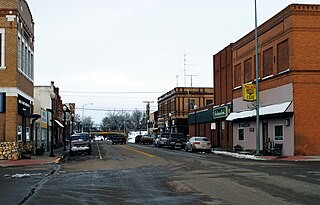
Wibaux is a town in and the county seat of Wibaux County, Montana, United States. It is the only incorporated town in Wibaux County. The population was 462 at the 2020 census.

Sagamore Hill was the home of the 26th president of the United States, Theodore Roosevelt, from 1885 until his death in 1919. It is located in Cove Neck, New York, near Oyster Bay on the North Shore of Long Island, 25 miles (40 km) east of Manhattan. It is now the Sagamore Hill National Historic Site, which includes the Theodore Roosevelt Museum in a later building on the grounds.

Theodore Roosevelt National Park is an American national park of the badlands in western North Dakota comprising three geographically separated areas. Honoring U.S. President Theodore Roosevelt, it is the only American national park named directly after a single person.
A guest ranch, also known as a dude ranch, is a type of ranch oriented towards visitors or tourism. It is considered a form of agrotourism.
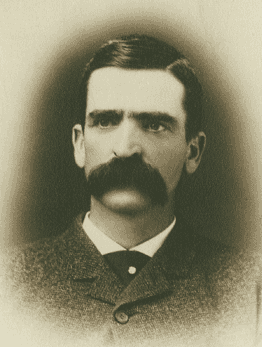
Seth Bullock was a Canadian-American frontiersman, business proprietor, politician, sheriff, and U.S. Marshal. He was a prominent citizen in Deadwood, South Dakota, where he lived from 1876 until his death, operating a hardware store and later a large hotel, the Bullock Hotel.

Marquis de Morès et de Montemaggiore was a French duelist, frontier ranchman in the Badlands of Dakota Territory during the final years of the American Old West era, a railroad pioneer in Vietnam, and antisemitic politician in his native France.

The Nokota horse is a feral and semi-feral horse breed located in the badlands of southwestern North Dakota in the United States. The breed developed in the 19th century from foundation bloodstock consisting of ranch-bred horses produced from the horses of local Native Americans mixed with Spanish horses, Thoroughbreds, harness horses and related breeds. The Nokota was almost wiped out during the early 20th century when ranchers, in cooperation with state and federal agencies, worked together to reduce competition for livestock grazing. However, when Theodore Roosevelt National Park was created in the 1940s, a few bands were inadvertently trapped inside, and thus were preserved.
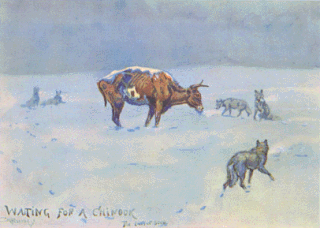
The winter of 1886–1887, also known as the Big Die-Up, was extremely harsh for much of continental North America, especially the United States. Although it affected other regions in the country, it is most known for its effects on the Western United States and its cattle industry. This winter marked the end of the open range era and led to the entire reorganization of ranching.

The Chateau de Mores in Medora, North Dakota, United States, is a historic home built by the Marquis de Mores in 1883 as a hunting lodge and summer home for his family and guests. The home is now part of the 128-acre (0.52 km2) Chateau de Mores State Historic Site, which also includes Chimney Park and de Mores Memorial Park.

Pierre Wibaux was a French cattle owner and ranchman in Montana and North Dakota at the turn of the 20th century. He immigrated from his native France to seek business opportunities in America and was among the most successful in the second wave of "Frontier Cowboys".

The Theodore Roosevelt Monument Assemblage is a collection of 24 stones and plaque located in the Theodore Roosevelt Memorial Park in Oyster Bay, New York. The stones and other objects are meant to each represent a "chapter" and together form a "book" telling the story of Theodore Roosevelt, 26th President of the United States.

The Maltese Cross Cabin is a cabin used by Theodore Roosevelt, before he was President. The cabin is currently located at the visitor center at Theodore Roosevelt National Park, just outside the town of Medora, North Dakota.

Peaceful Valley Ranch is about 3 miles (4.8 km) from the town of Medora, North Dakota in the South Unit of Theodore Roosevelt National Park, in western North Dakota. The ranch dates from 1885, when Benjamin Lamb bought the land and built its first buildings. After operating as a ranch, primarily raising horses, the ranch was developed by the Olsen family as a dude ranch before it was acquired by the National Park Service, and incorporated into the Roosevelt Recreation Demonstration Area, which eventually became the present national park. The ranch forms the core of the national park's South Unit. It overlooks the Little Missouri River, in the Little Missouri badlands.
Stuart's Stranglers was a well-known vigilante group in Montana that was founded in 1884 and led by Granville Stuart in response to widespread livestock theft at that time. They were also less commonly known as the "Montana Stranglers."
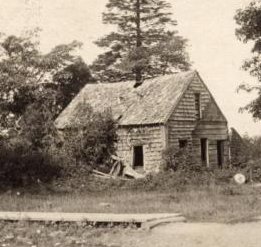
The William Sewall House is a historic house at 1027 Crystal Road in Island Falls, Maine. Built in 1865, it is a well-preserved example of vernacular Greek Revival style in a rural setting. The house is notable as the longtime home of a second-generation resident of the community, William Wingate Sewall, who had a long and enduring friendship with Theodore Roosevelt, a regular guest until 1878. The house was listed on the National Register of Historic Places in 1982. It is still in the hands of Sewall descendants, operated as a yoga retreat center.

This Theodore Roosevelt bibliography lists the works written by Theodore Roosevelt. Roosevelt was a diligent and skilled writer. When he lost his fortune in the Dakota Territory in 1886 and needed to make a living to support his family, he did so for the rest of his life by writing. Roosevelt wrote on a wide range of topics and genres, including history, autobiography, biography, commentary and editorials, memoirs, nature, and guide books. In addition, by one estimate Roosevelt wrote more than 150,000 letters. In his style, Roosevelt could be strong, introspective, exuberant, or angry—the subject dictated the style.

Lowell Edward Baier is an American attorney, successful entrepreneur, and an environmental historian and author. He has dedicated his life to natural resources and wildlife conservation. Throughout his career he has been an advisor to many elected officials and educators, including every successive presidential administration since George H. W. Bush, and has been an active and instrumental member of several national conservation groups.
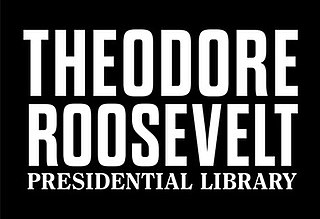
The Theodore Roosevelt Presidential Library is a planned museum focused on the life and legacy of Theodore Roosevelt, the 26th president of the United States. It is to be constructed at a site to the west of Medora, North Dakota, near Theodore Roosevelt National Park, which preserves sites associated with Roosevelt's travel in North Dakota between 1883 and 1887. A site in the Badlands of Medora was selected in 2020, as well as the design architect Snøhetta and the architect of record JLG Architects.
Yule Ranch is a historic property in Golden Valley and Slope counties in North Dakota, United States.
Elkhorn is an upcoming American television drama series, chronicling the early life of Theodore Roosevelt, 26th President of the United States. Roosevelt became a cowboy and rancher in the American Frontier in his mid-20s, before returning east to become the country's youngest President.



















